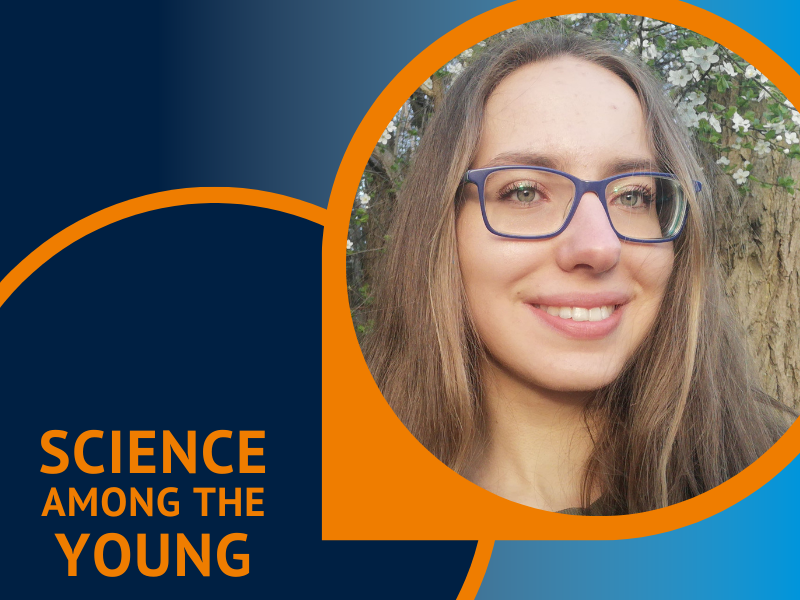What does the infinity mean?
Infinity is a concept or state that has no limit or end. In mathematics, it signifies the absence of a limit, allowing numbers and sets to extend beyond any specified values. In philosophy and metaphysics, infinity reflects unlimited extension or eternity, transcending our sensory understanding of reality.
SCIENCE | MY PASION
According to the definition taken from the Polish Language Dictionary, science is complete human knowledge arranged into a system of problems, but also a set of ideas that constitute a systematic whole and comprise a specific research field.
Science is also activity: learning and teaching.
Please read the “Science | My Passion” series, where our researchers present their work and show that science and research process can really draw us in.
MICHALINA PIĄTEK
student of the Mathematics degree programme
fot. private archive
|tekst: Michalina Piątek, student of the Mathematics degree programme|
|Anna Glenszczyk, PhD, tutor|
|This article was written for the Logic Workshop|
An essay of infinity
In this article, the author attempts to explore the nature of infinity and understand what challenges it poses to our understanding of reality. Does infinity apply to our material and metaphysical world? Or is it a mathematical concept? We invite you to reflect on this mysterious idea, which still remains one of the most enigmatic aspects of human thinking.
To begin with, let’s ask ourselves what is ‘infinity’? The answer isn’t simple, because it’s easy to get lost at the very beginning. Although the word is often used in both colloquial and scientific language, it is generally used in many different contexts and can be understood in many different ways. People of science (philosophers, mathematicians, linguists, theologians, cosmologists) understand infinity different than ordinary people in everyday conversations.
The PWN encyclopedia provides a definition:
‘infinity, a mathematical and philosophical concept intended to convey the ideas of unattainability, limitlessness, etc., defined in various ways.’
As you can see, this term is very general and doesn’t explain much, but it actually opens up a field for discussion, as it indicates a multitude of interpretations.
Is the universe infinite?
In our daily lives, infinity seems absent because everything we deal with can be counted, numbered, or classified. We are surrounded by a huge number of objects, people and animals, the number of which is finite. We use a language that has a certain number of words. We use a script that has a certain number of characters. We are aware that every road, path or forest has its end. Everything around must start and end somewhere. It is tangible, experiential and finite. Only when we look at the stars at night we get the feeling that we are looking at something that has no end. It’s hard to imagine that the universe could end somewhere. We get the impression that it has always been like this. Meanwhile, if we reached into the history of science and astronomy, we would be surprised: the idea of an infinite universe is relatively new. It appeared only in the 16th century, several decades after the groundbreaking work of Nicolaus Copernicus from 1543 ‘On the Revolutions of the Heavenly Spheres’. And although we don’t know who came up with it first, the idea of an infinite universe can be found in the work of the English mathematician and astronomer Thomas Digges. He was a propagator of the theory of the great Polish astronomer. He translated the cosmological part of Copernicus’s work, adding to this text his own theory of an infinite universe in which stationary stars are located at different distances from the Sun. Previously, the universe was imagined as a system of overlapping spheres, on which we could find the Moon, the Sun and then known planets. The last sphere was the sphere of the fixed stars, beyond which, according to the ancient scientists – there was nothing. For the medieval theologians, however, it was the place of additional spheres invisible to mortal humans.
Such an idea of an infinite universe was presented by Digges. Does modern science have anything new to say about it? Of course it does!
In 1929, the American astronomer Edwin Hubble calculated the relationship between the distance between the galaxies and the speed at which they move away from each other, and on this basis he concluded that the universe is not static – and it is even expanding. Hence, a logical conclusion follows: if something expands, it means that it‘s not infinite. Besides, we can estimate the number of atoms in the universe or their mass – we certainly wouldn’t be able to do that if it was infinite.
Infinity all around us
So what is infinite if even the universe isn’t? Here the problem appears. Modern scientists are unable to indicate anything in the world around us that would be infinite. Every existing object has its own boundaries. Physical quantities have minimum and maximum values, e.g. temperature, which is a measure of the average kinetic energy associated with the motion and vibration of the particles that make up a given system, reaches the lowest possible value when all particles of a given system are at rest (zero Kelvin). However, according to the current state of knowledge, the maximum value reached just after the Big Bang (1032 degrees Kelvin).
For a long time, it was also believed that light travels at an infinite speed. This lasted until 1676, when the Danish astronomer Ole Rømer gave the first evidence of the finite speed of light and the time it took to travel through the earth’s orbit. He based his calculations on observations of Jupiter’s satellite eclipses by this planet.
Infinity in the theoretical world
Our search for infinity in the real world failed. So it’s time to search for it in the theoretical world created by the power of human minds, i.e. in mathematics. Of course, by moving to mathematics, we leave out philosophy – with a whole range of different meanings of infinity, and theology where infinity is a term used to define the attributes of the Absolute (God, omniscience, power, goodness, might, etc.). As we know, in mathematics, everything that is correctly defined is true. Therefore, the concept of infinity has found a very wide application in this field of science, without the need to prove its existence in the real world.
Ancient Greek scientists were the first to treat the problem of infinity scientifically. They were generally afraid of admitting infinity into their mathematical principles, just as they avoided introducing zero, because, in their view, zero might be considered ‘something’ and thus, contradict their system of logic. So even though they were close to accepting infinity in their mathematical system, they never took the final step to include it. They were happy to consider endless processes, but they were influenced by the many paradoxes that they entailed. Aristotle was the first scientist to distinguish different types of infinity. He divided it into potential infinity and actual infinity. Potential infinity can be understood as the possibility of creating another number, e.g. for natural numbers, for each number ‘n’ we can create the number ‘n+1’. While the possibility of creating another number was accepted by all scientists as potential infinity, having this number defined actual infinity, which the ancient philosophers and mathematicians no longer recognised. Even today, most studies and surveys indicate that 50% of respondents don’t recognise the existence of actual infinity. Interestingly, this is not about intellectual maturity, because statistics show that the view on this matter doesn’t change with the age of the respondents. The rejection of the idea of actual infinity is related to the fact that often the issues related to it seem to be contrary to elementary logic, i.e. what we call ‘intuition’. With the development of mathematics, more and more new sections related to the controversy around infinity gradually emerged. Especially mathematical analysis related to the secrets of infinitesimal quantities is not accidentally called infinite analysis. Its origins can be traced back to Eudoxus of Cnidus in the 4th century BC, but it was systematically developed in the 17th century by scholars of the same class as Newton, Leibniz or Roberval.
Georg Cantor – pioneer of infinity mathematics
The most outstanding mathematician associated with the concept of infinity is a German mathematician, a pioneer of set theory, Georg Cantor, who lived at the turn of the 19th and 20th centuries. It can be said that the history of infinity in mathematics is divided into that before and after Cantor. He arranged the basic definitions related to it, introducing, among others, the concept of a “cardinal number” serving “calculating” infinity.
He obtained his most important results in 1874. He called sets of the same power as the set of natural numbers countable and denoted the power common to all of them with the first letter of the Hebrew alphabet with the coefficient zero, i.e. ℵ0 (read: aleph zero). In 1874 he also proved that the set of all real numbers on the segment [0,1] is not countable. For this purpose, he used the so-called diagonal reasoning, later used in many various situations. He assumed that all the real numbers of the segment [0,1] can be arranged in a sequence, so they can be written in the form of an array. He marked the power of the set of real numbers with the Gothic ‘c’ (from the word continuum).
He ended his struggle with infinity with a severe depression. At the end of his life, he plunged into deep mysticism and developed the concept of Absolute Infinity, which he identified with God.
I think it is appropriate to end my essay here, because further exploration of this topic can cause feelings similar to vertigo and instead of providing a better understanding of the topic, can cause the opposite effect, i.e. to a complete confusion of the concepts. As you can see, the issues related to infinity are fascinating and lead to the conclusion that on the way to understanding this concept there are still many turns waiting for us, and perhaps it is a journey that will never end.







